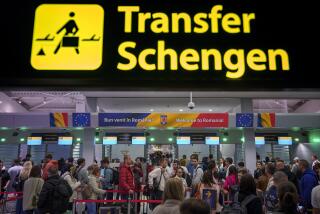European students abroad facing coronavirus scare scramble back to their home countries
Yinfay Liu was loving Coimbra, Portugal, a city built upon a hill.
She enjoyed gazing at the sea of rooftops that spread before her. The ancient streets, the colorful houses, felt a world away from her native Belgium — yet also, thanks to the friends she had made there, warm and familiar.
Liu, 28, was conducting biomedical research and meeting dozens of international students studying abroad when she got the news Friday: Her program was canceled because of the threat of COVID-19. By Monday, the country would close its borders with Spain, where coronavirus cases were skyrocketing.
Liu felt dazed. She packed her bags, overcome with sadness, to head home to Flanders.
“I couldn’t even say goodbye,” she said in a phone interview.
During the last week, students across the continent have rushed to their home countries after their study abroad programs were cut short — as has happened elsewhere. The programs were part of Erasmus, the European Union’s signature educational exchange meant to foster cross-cultural connection and a sense of unity among the continent’s college students.
Erasmus, created in 1987, is one of a slew of policies and programs established in Europe three decades ago. In the 1990s, capitalizing on the sense of freedom that accompanied the Soviet Union’s fall, European leaders agreed on a series of economic and security policies that underpin the EU’s single market. In 1995, the Schengen agreement paved the way for the abolition of most EU passport controls and made it easier for Europeans to settle and work in other countries.
As a result, Europeans in their 20s have grown up in an era of no borders, one in which free movement is taken for granted and significant connections with the rest of the continent — either through study, work or family — are almost expected.
But as the coronavirus has spread across Europe, hard borders have returned.
That reality, along with the United Kingdom’s acrimonious departure from the EU at the end of January, has left young Europeans bewildered — and, in some cases, disillusioned.
Orlagh McDonald, 20, left Prague for Scotland after the Czech Republic announced last week that it would shut its borders. She had spent a month in the Czech capital, living in an apartment with other young people and planning trips to neighboring countries on days off from classes.
“I’m gutted,” she said by phone from her home near Edinburgh, where she arrived Tuesday night after airlines had canceled multiple flights. “I was having the best time on Erasmus.”
For McDonald, the sudden, forced departure caused her to reflect on Europe’s unity during times of crisis. Before the EU announced Tuesday that it was shutting its external borders, individual member countries such as the Czech Republic had enacted their own lockdowns. Some, like Germany, hadn’t notified neighboring countries before their prohibitions went into effect.
“The EU’s open-border policy was completely thrown out the window in a couple of days,” McDonald said.
Now that she has left Prague, McDonald probably will not be able to participate in Erasmus again. And though British students can study abroad with Erasmus during the 2020-21 school year, it’s unclear how Brexit will affect their participation afterward.
The fact that the cancellation of her Erasmus program and Brexit happened in the same year has made McDonald’s unexpected homecoming particularly bittersweet.
“I feel a sense of loss as a European person and what I’ve lost as an EU citizen,” said McDonald, who had been too young to vote in the 2016 Brexit referendum that resulted in Britain choosing to exit the European Union. “The generation of people my age in Scotland and the U.K. are really grieving what they could have had as EU citizens going into the working world.”
Ethan Hood, 19, from Canterbury, had never lived outside England. Then, in September, he moved to Malta, where he would spend the year studying tourism.
The year was everything the Erasmus program had promised. Hood lived in an international dorm and made friends from around Europe — Finland, Greece, Germany, France. Each week, they took turns cooking meals from their home countries. On his night to cook, Hood prepared a traditional Sunday roast. (Not fish and chips, as his friends had expected.)
“This whole Erasmus experience has made me realize that … there are a lot of similarities between different places within Europe,” Hood said.
Last week, as the virus spread, his classes were canceled and roommates started catching flights out.
On Tuesday, he booked a flight home.
Hood doesn’t know what returning to England will be like. He was living in Malta when Britain officially exited the EU, and he wasn’t plugged into the political atmosphere back home, preferring instead to focus on his study abroad experience.
“It hasn’t really hit me yet,” he said.
Liu said COVID-19 presents “the ultimate test for everyone to show how much we can be in solidarity.”
“I try to stay positive,” she said from her home in the Belgian countryside, where she was trying to find ways to fill her days. “Because in the end, I have no idea what will happen.”
Similarly, Sottish student Hayley Morrison, who was on Erasmus in Spain and remained there despite the country’s lockdown, said Europe’s best bet was cooperation, not division.
The night before Spain closed its restaurants to prevent the virus from spreading, a bar across the street from her flat invited neighbors in for free tapas. During the lockdown, Morrison has bought groceries for her elderly upstairs neighbor to spare her the risk of leaving her apartment.
“When difficult times happen, everyone has to unite together,” Morrison said.
In the meantime, European countries continue shutting their borders. Officials have set up checks along the borders, leading to snarling lines of traffic as they screen individual drivers.
On Wednesday morning, hours before a Belgium-wide quarantine was to go into effect, John Woods, 26, waited to enter a grocery store in Brussels. Watching countries enforce borders was an alien experience, he said, but necessary to mitigate the spread of the coronavirus.
“It’s not a threat to European unity at all,” the native of Ireland said.
While he spoke, the line outside the supermarket inched forward. The hopeful shoppers spoke in a medley of languages — French, Spanish, English — as, one by one, they entered the store.
Bernhard is a special correspondent.
More to Read
Start your day right
Sign up for Essential California for news, features and recommendations from the L.A. Times and beyond in your inbox six days a week.
You may occasionally receive promotional content from the Los Angeles Times.






